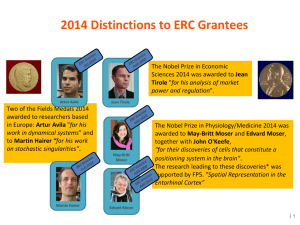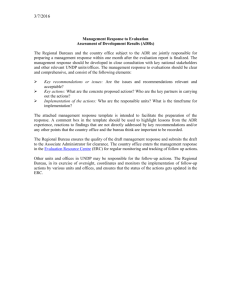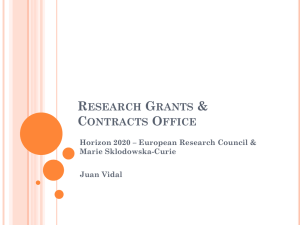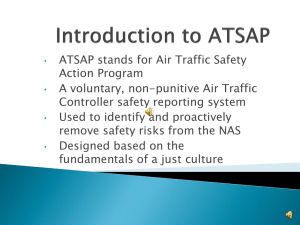UK Research Office The Office, our mission and services
advertisement
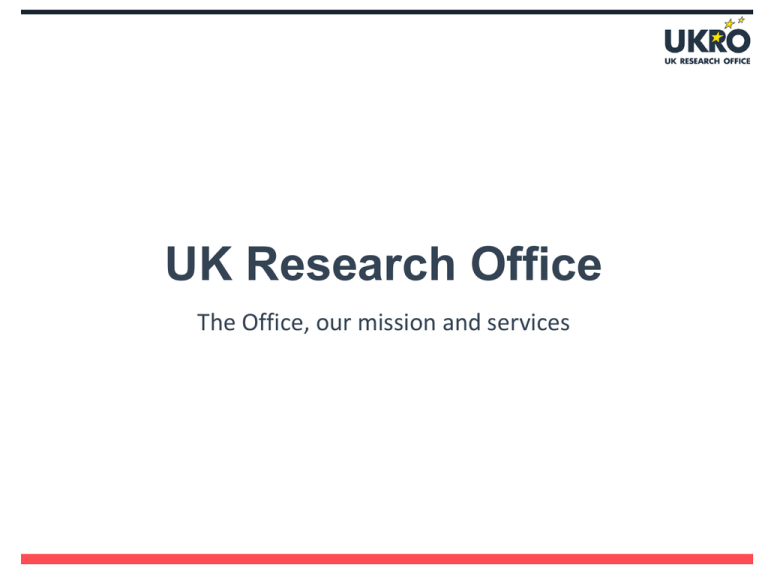
UK Research Office The Office, our mission and services About us • UKRO is the office of the seven UK Research Councils in Brussels and delivers a subscription-based advisory service for around 150 research organisations in the UK and beyond. • UKRO also provides National Contact Point services on behalf of the UK Government. • Our mission is to maximise UK engagement in EU-funded research, innovation and higher education The team • 14 staff in Brussels including eight European Advisors Our daily work • UKRO services: offering a wide range of quality services to help subscribers and sponsors make informed decisions on participating in EU programmes • Policy work: supporting UK input into European research policy development and implementation. • Brussels liaison: establishing and maintaining contacts with the European Institutions and other major Brussels stakeholders in research and innovation. Our suite of services • UKRO Portal: always up to date with the latest in EU funding and policy • Enquiry service and you dedicated European Advisor: individual support and advice, all year round • Annual visit: a tailored event for your institution • Meeting room: a venue in Brussels – free of charge • Specialist training courses, focus groups and information events: providing in-depth insight into EU programmes • Annual conference for European officers: the latest information on programmes and policies presented by European Commission staff, and other speakers • UK National Contact Points for the Marie Curie Actions and the European Research Council (ERC) UKRO Portal – sign up today at www.ukro.ac.uk • • • • Tailored news articles on EU funding and policy UKRO Factsheets on Horizon 2020 and other funding streams Email alert function and search engine with refiners and tags Daily or weekly alerts - personalise your account to best meet your needs! UKRO Factsheets on the Portal Annual visit • Bespoke annual visit to your institution by your UKRO European Advisor • Programme is agreed with the European Liaison Officer (ELO) • Sessions can cover a variety of subjects and are tailored to each audience Your European Advisor • All subscribers have a named contact at UKRO • Contact your European Advisor with questions on EU funding programmes and EU research and innovation policy • Help with legal and financial questions • Advice on the best funding stream for your research project • General advice on proposal writing UKRO Conference • 2-day event for EU policy and networking • Key event for European Liaison Officers, European research managers, Research Councils and policy makers • High-level European Commission and other speakers UKRO National Contact Points • Advice on the European Research Council and the Marie Skłodowska-Curie Actions • Websites – www.ukro.ac.uk/erc – www.ukro.ac.uk/mariecurie • Helpdesk – erc-uk@bbsrc.ac.uk; Phone: 0032 2289 6121 – mariecurie-uk@bbsrc.ac.uk; Phone: 0032 2 230 0318 Horizon 2020 Pillar One: Excellent Science Horizon 2020 structure Excellent Science European Research Council (ERC) Future and Emerging Technologies (FET) Marie SkłodowskaCurie Actions (MSCA) Research Infrastructures Industrial Leadership Societal Challenges Health and Wellbeing Leadership in Enabling and Industrial Technologies (LEIT) - ICT, NMBP, Space Access to Risk Finance Innovation in SMEs Food security Transport Energy Climate action Societies Security Widening Participation; Science with and for Society, Mainstreaming of Social Sciences and Humanities (SSH) and ICT, Fast Track to Innovation European Institute of Innovation and Technology (EIT) EURATOM Joint Research Centre (JRC) Excellent Science Rationale “…reinforce and extend the excellence of the Union’s science base and to consolidate the European Research Area in order to make the Union’s research and innovation system more competitive on a global scale…” • Activities under this pillar cover a wide range of Europe’s research and innovation needs • Forward-looking, long-term skill development and capacity building to support emerging European talent • Largely science-driven pillar with many ‘bottom-up’ opportunities Excellent Science Opportunities European Research Council Research Infrastructures Marie SklodowskaCurie Actions Future and Emerging Technologies European Research Council What is the ERC? “The fundamental activity of the ERC is to provide attractive, long-term funding to support excellent investigators and their research teams to pursue groundbreaking, high-gain/high-risk research.” “Scientific excellence is the sole criterion on the basis of which ERC frontier research grants are awarded.” “The ERC’s frontier research grants operate on a ‘bottomup’ basis without predetermined priorities.” ERC Work Programme 2016 text ERC Budget in Horizon 2020 ERC allocated around €12.7 billion for Horizon 2020 (compares to the allocation of €7.5 billion for FP7). Largest amount of funding will go to the Starting Grants and Consolidator Grants schemes. In the present budget, support to ERC is under its 2013 level for 3 years Source: ERC ERC Frontier Research Grant Schemes • The ERC seeks to fund the best ‘frontier research’ proposals submitted by excellent researchers in the area of their choice. • Funds projects led by a Principal Investigator, if necessary supported by a research team (no requirement for collaboration or forming a team across different EU countries) • 25 panels in 3 domains which proposals can be submitted to: • Physical Sciences and Engineering (PE) • Life Sciences (LS) • Social Sciences and Humanities (SH) • Not suitable for consortium type proposals ERC Grant Schemes Starting Grants • For PIs 2-7 years from PhD, up to €2 million for 5 years Consolidator Grants • For PIs 7-12 years from PhD, up to €2.75 million for 5 years Advanced Grants • For leading researchers, up to €3.5 million for 5 years. Synergy Grants • for 2 to 4 PIs, up to €15 million for 6 years. No call in 2016 or 2017. Proof of Concept • For ERC grant holders only, up to €150,000 for 18 months Proof-of-Concept grants • “Maximise the value of the excellent research that the ERC funds, by funding further work (i.e. activities which were not scheduled to be funded by the original ERC frontier research grant) to verify the innovation potential of ideas arising from ERC funded projects.” • Only PIs on ERC frontier research grants that are on-going or have ended less than 12 months before the opening date of the call are eligible. • The funding will cover activities at the very early stage of turning research outputs into a commercial or socially valuable proposition, i.e. the initial steps of pre-competitive development. • Up to €150,000 over 18 months Principal Investigator (PI) • Expected to spend: – StG: A minimum 50% of total working time on the ERC project or – CoG: A minimum 40% of total working time on the ERC project and – AdG: A minimum 30% of total working time on the ERC project and • A minimum of 50% of total working time in an EU Member State or Associated Country (this does not exclude fieldwork/research outside Europe needed to achieve research objectives) • Central to the grant and review criteria • Expected to lead their team and be fully engaged in the running of the grant • Can be of any age, nationality or current location PI Eligibility • StG - 2 to 7 years from date of award of first PhD or equivalent (as at 1 January) • CoG – 7 to 12 years from date of award of first PhD • Extensions for certain reasons (must be properly documented). These are: – Maternity leave (18 months per child), paternity leave (actual amount of documented leave taken), national service, long-term illness (over 90 days) of PI or a close family member (child, spouse, parent or sibling) and clinical training – For other ‘unavoidable statutory reasons’ please contact us for advice • AdG: No specific eligibility criteria with respect to academic requirements not an eligibility criterion to have been awarded a PhD. Should be established research leaders who have made original and significant contributions to research. Competitive Candidates for StG and CoG • Must have already shown potential for/demonstrated research independence and evidence of maturity • For example, it is expected that applicants: – will have produced at least one/several important publication without the participation of their PhD supervisor – can demonstrate promising track record of early achievements appropriate to their field and career stage, including: • Significant publications (as main author) in major international peerreviewed major multidisciplinary scientific journals or in leading international peer-reviewed journals in their field • May have monographs, invited presentations, granted patents, awards, prizes Competitive Candidates for AdG • Active researcher • Track record of significant achievements in last 10 years – 10 publications (as senior author) in major international peer-reviewed journals which are multidisciplinary or leading journals or conference proceedings in their field. – Or 3 major research monographs, of which at least one is translated into another language. – If appropriate to their research field: granted patents (5), invited presentations (10), led expeditions (3), organised international conferences (3), international recognition (awards, prizes, academy membership, artefact with documented use) and leadership in launching the careers of outstanding researchers and industrial innovation. • Internationally recognised as exceptional leader in terms of originality and significance of research contribution UK Success in ERC • The UK was the most successful country in applying to the ERC in FP7 • Around 20% of all ERC grants are based in the UK • PIs at over 80 institutions in the UK have been awarded an ERC grant • Over 1100 grants have been awarded to UK Host Institutions since 2007. • See here for the details of funded projects: http://erc.europa.eu/erc-funded-projects • And here for more statistics: http://erc.europa.eu/projects-andresults/statistics ERC Success Rates by Host Institution Country (StG, CoG, AdG 2007-2013) Source: ERC ERC 2016 Calls Starting Grant Consolidator Grant Advanced Grant Proof of Concept Call identifier ERC-2016-StG ERC-2016-CoG ERC-2016-AdG ERC-2016-PoC Call Opens 29 July 2015 15 October 2015 24 May 2016 22 October 2015 17 November 2 February 2016 2015 1 September 2016 16 February 2016 26 May 2016 4 October 2016 540 (235) 20 (130) Deadline Budget €M (estimated grants) 485 (335) 605 (335) ERC 2014 Overall Call Results Call Deadline No. of proposals submitted No. of retained proposals Success Rate % (of eligible proposals) ERC-2014-StG 27/03/2014 3273 375 11.46 ERC-2014-CoG 20/05/2014 2527 372 14.98 ERC-2014-AdG 21/10/2014 2287 190 8.44 ERC-2014-PoC 01/04/2014 01/10/2014 182 260 50 51 27.93 20.65 ERC: More information • • • • • • • • • Participant Portal ERC website ERC statistics on funded projects ERC panel members ERC funded projects 2016 ERC Work Programme NCP – erc-uk@bbsrc.ac.uk ERC Annual Report ERC report on activities in FP7 (2007-2013) Marie Skłodowska-Curie Actions (MSCA) Marie Skłodowska-Curie Actions Work Programme “.. Ensure excellent and innovative research training as well as attractive career and knowledge-exchange opportunities through cross-border and cross-sector mobility of researchers to best prepare them to face current and future societal challenges.” Total budget: €6.2bn Marie Skłodowska-Curie Actions Innovative Training Networks (ITN) • For Early Stage Researchers Individual Fellowships (IF) • For Experienced Researchers Research and Support Staff Exchange (RISE) • Exchange visits (secondments) of staff Co-funding of programmes (COFUND) • For regional, national, international doctoral or fellowship programmes Key MSCA Definitions ITN COFUND RISE IF RISE COFUND Early Stage Researcher (ESR) At the time of recruitment (ITN) by the host organisation, must be in the first 4 years (full-time research experience) of their research careers and have not been awarded a doctoral degree Experienced Researcher (ER) At the time of the call deadline (IF) or secondment (RISE) by the host organisation, must be in possession of a doctoral degree or have at least 4 years of full-time equivalent research experience Academic sector Includes universities and higher education institutions (public and private) awarding degrees, non-profit research institutions (public and private), and international European interest organisations Nonacademic sector Includes any socio-economic actor not included in the academic sector Standard Mobility Rule “At the time of the relevant deadline for submission of proposals, or recruitment/secondment by the host organisation, depending on the action, researchers shall not have resided or carried out their main activity (work, studies, etc.) in the country of their host organisation for more than 12 months in the 3 years immediately prior to the reference date.” No restrictions on nationality! Typical Innovative Training Network • Collaborative work in multidisciplinary, international consortia (academic + non-academic) • Proposing competitively selected joint research training/doctoral programme for Early-Stage Researchers • Recruit researchers across the consortium – each researcher has an Individual Research Project • Advanced research and transferable skills training e.g. communication, research management, societal outreach, entrepreneurship, IP • Exposure to non-academic sector (secondments) • Networking events ITN activities Research and Innovation Dissemination Communication Innovative Training Networks European Training Networks • At least three beneficiaries from different MS/AC • Doctoral programme enrolment optional • Maximum 540 researcher-months European Joint Doctorates European Industrial Doctorates • At least three beneficiaries from different MS/AC • Doctoral programme enrolment mandatory • Joint governance, admission, selection, supervision, monitoring and assessment mandatory • Award of joint, double or multiple doctoral degree mandatory • Maximum 540 researcher-months • At least one academic and one non-academic partner (primarily enterprises) • Doctoral programme enrolment mandatory • Joint governance, admission, selection, supervision, monitoring and assessment mandatory • Maximum 180 researcher-months Commission contributions Researcher unit cost [person/month] Scheme Living allowance* Mobility allowance Family allowance Institutional unit cost [person/month] Research, training and networking costs Managemen t and overheads ITN 3110 600 500 1800 1200 IF 4650 600 500 800 650 1800 700 RISE COFUND 2000 ESRs 3710 ERs 5250 650 * A correction co-efficient will apply to these costs (see MSCA Work Programme table 4) For COFUND: Unit costs are subject to a co-funding rate of 50% as established in the grant agreement. Unit costs are reduced by 50% in case researchers are recruited under fixed-amount fellowships. Individual Fellowships (IF) • Individual grant for experienced researchers to support their mobility, research project and training • Opportunity to gain new knowledge in and outside academia, work on research projects in or outside Europe • Fully-funded fellowships (salary, travel, research costs) hosted by academic or non-academic organisation • No nationality, age or career stage restrictions • Specific support for return of researchers to Europe (RI) and career restart for individuals with high potential who have been out of active research (CAR) Individual Fellowships (IF) Outgoing Return New Commission contributions Researcher unit cost [person/month] Scheme Living allowance* Mobility allowance Family allowance Institutional unit cost [person/month] Research, training and networking costs Managemen t and overheads ITN 3110 600 500 1800 1200 IF 4650 600 500 800 650 1800 700 RISE COFUND 2000 ESRs 3710 ERs 5250 650 * A correction co-efficient will apply to these costs (see MSCA Work Programme table 4) For COFUND: Unit costs are subject to a co-funding rate of 50% as established in the grant agreement. Unit costs are reduced by 50% in case researchers are recruited under fixed-amount fellowships. Research and Innovation Staff Exchange (RISE) • “Aim to promote international and inter-sector collaboration through research and innovation staff exchanges, and sharing of knowledge and ideas from research to market (and vice-versa) for the advancement of science and development of innovation” • Should involve institutions from the academic and non-academic sectors (particularly SMEs) based in MS/AC and/or third countries • Development of partnerships in the form of joint research and innovation activities between the participants • Knowledge sharing via international and/or inter-sector mobility through two way secondments of staff with built-in return mechanism – no recruitment of new staff! – Exchanges between MS/AC only: secondments must be inter-sectoral – Exchanges between MS/AC and third countries: secondments can be same sector and/or intersectoral Research and Innovation Staff Exchange • Participants must be from at least three different countries, at least two of which are MS/AC • If all participants in same sector one participant country must be a third country • Secondment period – 1-12 months (does not need to be continuous) • Projects up to 4 years and max 540 exchange visit months • Typical activities in RISE: Workshops Joint R&I Knowledge exchange Networking New skills Conferences RISE – Minimum Set-up • At least 3 independent participants in 3 different countries • At least 2 participants from 2 different MS/AC • If all in MS/AC: at least 1 academic and 1 non-academic MS/AC MS/AC TC RISE MS/AC NonAcademic MS/AC Academic MS/AC RISE RISE – Eligible secondments Intra-European Exchanges MS/AC 1 Academic Non-Academic MS/AC 2 MS/AC 3 RISE – Eligible secondments Europe – Third Country Exchanges MS/AC 1 • Secondments from TC to MS/AC subject to H2020 funding rules! • If funded by TC describe in proposal! MS/AC 2 TC Commission contributions Researcher unit cost [person/month] Scheme Living allowance* Mobility allowance Family allowance Institutional unit cost [person/month] Research, training and networking costs Managemen t and overheads ITN 3110 600 500 1800 1200 IF 4650 600 500 800 650 1800 700 RISE COFUND 2000 ESRs 3710 ERs 5250 650 * A correction co-efficient will apply to these costs (see MSCA Work Programme table 4) For COFUND: Unit costs are subject to a co-funding rate of 50% as established in the grant agreement. Unit costs are reduced by 50% in case researchers are recruited under fixed-amount fellowships. MSCA calls – 2016 timetable Call identifier Publication date Deadline Call budget, €M MSCA-ITN-2016 MSCA-ITN-2017 MSCA-RISE-2016 MSCA-RISE-2017 15 October 2015 15 September 2016 8 December 2015 1 December 2016 370 430 MSCA-IF-2016 MSCA-IF-2017 12 April 2016 11 April 2017 12 January 2016 10 January 2017 28 April 2016 5 April 2017 14 September 2016 14 September 2017 80 80 218.50 248 2014 MSCA Success Rates No. of eligible proposals submitted No. of retained proposals Success Rate % MSCA-ITN-2014 1153 121 10.49% MSCA-RISE-2014 200 84 42% MSCA-IF-2014 7409 1305 17.61% MSCA-COFUND-2014 90 23 25.56% MSCA-Researchers’ Night-2014 123 48 39% Call Useful Links • UKRO Subscriber factsheet on Marie Curie Actions https://www.ukro.ac.uk/subscriber/Factsheets/factsheet_msca.pdf • Commission’s Marie Curie Actions websites ec.europa.eu/research/mariecurieactions and ec.europa.eu/programmes/horizon2020/en/h2020-section/mariesklodowska-curie-actions • UK NCP Helpdesk Email: mariecurie-uk@bbsrc.ac.uk Phone: + 32 2 230 0318 Website: www.ukro.ac.uk/mariecurie
